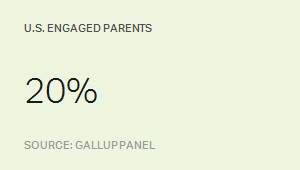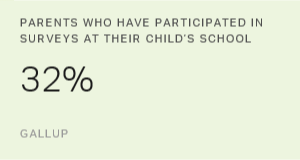Story Highlights
- Parent engagement is vital for successful schools
- School leaders can measure and improve parent engagement
- Five drivers most improve parent engagement
Parent engagement is a crucial ingredient for successful schools. Fully engaged parents are more than satisfied and involved with their child's school; they have a powerful emotional relationship with it. They believe their child's school delivers on what it promises and are proud to be a parent there. They even go so far as to say that the school is perfect for their child.
Unfortunately, recent research finds that just 20% of U.S. public school parents are fully engaged with their child's school. Another 57% of parents are indifferent, while 23% of parents are actively disengaged with the school their child attends.
The good news is that school leaders can intentionally measure and improve parent engagement over time by focusing their efforts using five key drivers.

Top Five Drivers of Parent Engagement
To better understand the factors that inspire parent engagement, Gallup conducted a study with a nationally representative sample of 3,356 parents across the U.S. Further analysis identified five drivers that lead to success in promoting parent engagement:
- Leadership. Parents appreciate when principals and other school leaders are in touch with the needs of the students and community and respond appropriately to those needs as they arise. They are looking for leaders who create a respectful, open and trusting environment. Parents are more likely to be engaged when the school is led in a way that makes them excited about the future.
- Academic standards. Parents are seeking schools that are committed to high academic standards. They believe that schools should challenge students appropriately in class and with homework. Parents appreciate when the school provides opportunities for each student to achieve success in a way that fits how he or she learns best.
- School environment. In an era where three in 10 U.S. parents worry about their child's safety at school, parents focus on key aspects of the school environment very closely. Schools should be places where students are always treated with respect and where appropriate discipline is in place. Parents also seek a welcoming school environment. Fully engaged parents believe that schools should be a place where their child looks forward to spending his or her days.
- Personalized learning. Parents are looking for an environment where teachers and staff know their child's individual strengths and needs. They want their child to have the opportunity to do what he or she does best every day in an environment that identifies and appreciates student strengths. They believe that successful schools are places where their child's development is paramount and where teachers make connections that help students know their schoolwork is important. These key factors not only encourage parent engagement; they are also associated with increased student engagement.
- Communication and involvement. In too many schools, communication with parents consists of a newsletter and the occasional urgent message alerting parents to a security issue or weather delay. Engaged parents want meaningful communication that goes beyond this. They appreciate positive feedback about their child and want to work with teachers to ensure their child's success. Great schools build a culture that encourages open communication and that invites parents to become involved by playing an active role in their child's education.
When parents are very satisfied with at least one of these five drivers, 58% are fully engaged, Gallup analysis shows. But if parents are very satisfied with all five drivers, 84% are fully engaged -- and none are actively disengaged.
Though promoting parent engagement requires intentional effort from school leaders, focusing on the five drivers previously mentioned doesn't require additional funding or an extensive time investment. Leaders are encouraged to consider each of these drivers as they work to increase levels of parent engagement at their schools.
Gallup Education can work with you to improve parent engagement in schools and teacher and student performance:
- Become a strengths-based school, starting with practical steps for building an engaged and thriving school culture.
- Download the results from Gallup's survey of K-12 school district superintendents.
- Watch our on-demand webinar, "Talent-Based Hiring: Selecting the Very Best for Your Schools."
Survey Methods
Results are based on a Gallup Panel Web study completed by 3,356 national adults, aged 18 and older, with at least one child in a U.S. public school. The survey was conducted May 26-June 10, 2015. The Gallup Panel is a probability-based longitudinal panel of U.S. adults who are selected using random-digit-dial (RDD) phone interviews that cover landlines and cellphones. Address-based sampling methods are also used to recruit panel members. The Gallup Panel is not an opt-in panel and members are not given incentives for participating. For results based on this sample, one can say that the maximum margin of sampling error is ±1.7 percentage points, at the 95% confidence level. Margins of error are higher for subsamples. In addition to sampling error, question wording and practical difficulties in conducting surveys can introduce error or bias into the findings of public opinion polls.
Learn more about how the Gallup Panel works.
